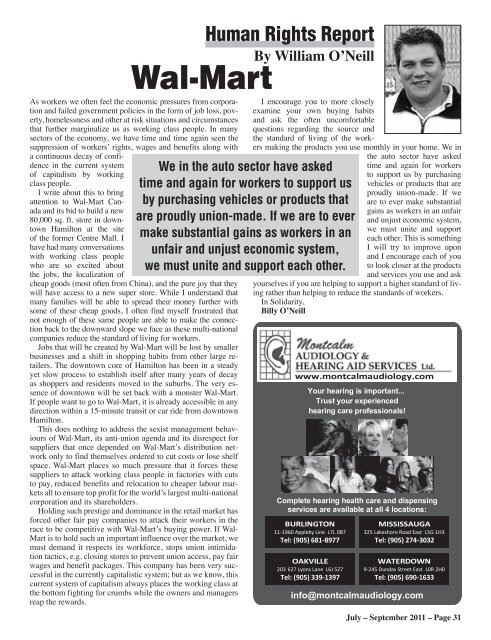seven-o-seven seven-o-seven REPORTER - CAW Local 707
seven-o-seven seven-o-seven REPORTER - CAW Local 707
seven-o-seven seven-o-seven REPORTER - CAW Local 707
You also want an ePaper? Increase the reach of your titles
YUMPU automatically turns print PDFs into web optimized ePapers that Google loves.
Wal-Mart<br />
As workers we often feel the economic pressures from corporation<br />
and failed government policies in the form of job loss, poverty,<br />
homelessness and other at risk situations and circumstances<br />
that further marginalize us as working class people. In many<br />
sectors of the economy, we have time and time again seen the<br />
suppression of workers’ rights, wages and benefits along with<br />
a continuous decay of confi-<br />
dence in the current system<br />
of capitalism by working<br />
class people.<br />
I write about this to bring<br />
attention to Wal-Mart Canada<br />
and its bid to build a new<br />
80,000 sq. ft. store in downtown<br />
Hamilton at the site<br />
of the former Centre Mall. I<br />
have had many conversations<br />
with working class people<br />
who are so excited about<br />
the jobs, the localization of<br />
cheap goods (most often from China), and the pure joy that they<br />
will have access to a new super store. While I understand that<br />
many families will be able to spread their money further with<br />
some of these cheap goods, I often find myself frustrated that<br />
not enough of these same people are able to make the connection<br />
back to the downward slope we face as these multi-national<br />
companies reduce the standard of living for workers.<br />
Jobs that will be created by Wal-Mart will be lost by smaller<br />
businesses and a shift in shopping habits from other large retailers.<br />
The downtown core of Hamilton has been in a steady<br />
yet slow process to establish itself after many years of decay<br />
as shoppers and residents moved to the suburbs. The very essence<br />
of downtown will be set back with a monster Wal-Mart.<br />
If people want to go to Wal-Mart, it is already accessible in any<br />
direction within a 15-minute transit or car ride from downtown<br />
Hamilton.<br />
This does nothing to address the sexist management behaviours<br />
of Wal-Mart, its anti-union agenda and its disrespect for<br />
suppliers that once depended on Wal-Mart’s distribution network<br />
only to find themselves ordered to cut costs or lose shelf<br />
space. Wal-Mart places so much pressure that it forces these<br />
suppliers to attack working class people in factories with cuts<br />
to pay, reduced benefits and relocation to cheaper labour markets<br />
all to ensure top profit for the world’s largest multi-national<br />
corporation and its shareholders.<br />
Holding such prestige and dominance in the retail market has<br />
forced other fair pay companies to attack their workers in the<br />
race to be competitive with Wal-Mart’s buying power. If Wal-<br />
Mart is to hold such an important influence over the market, we<br />
must demand it respects its workforce, stops union intimidation<br />
tactics, e.g. closing stores to prevent union access, pay fair<br />
wages and benefit packages. This company has been very successful<br />
in the currently capitalistic system; but as we know, this<br />
current system of capitalism always places the working class at<br />
the bottom fighting for crumbs while the owners and managers<br />
reap the rewards.<br />
Human Rights Report<br />
By William O’Neill<br />
We in the auto sector have asked<br />
time and again for workers to support us<br />
by purchasing vehicles or products that<br />
are proudly union-made. If we are to ever<br />
make substantial gains as workers in an<br />
unfair and unjust economic system,<br />
we must unite and support each other.<br />
I encourage you to more closely<br />
examine your own buying habits<br />
and ask the often uncomfortable<br />
questions regarding the source and<br />
the standard of living of the workers<br />
making the products you use monthly in your home. We in<br />
the auto sector have asked<br />
time and again for workers<br />
to support us by purchasing<br />
vehicles or products that are<br />
proudly union-made. If we<br />
are to ever make substantial<br />
gains as workers in an unfair<br />
and unjust economic system,<br />
we must unite and support<br />
each other. This is something<br />
I will try to improve upon<br />
and I encourage each of you<br />
to look closer at the products<br />
and services you use and ask<br />
yourselves if you are helping to support a higher standard of living<br />
rather than helping to reduce the standards of workers.<br />
In Solidarity,<br />
Billy O’Neill<br />
<br />
<br />
<br />
<br />
<br />
<br />
<br />
<br />
<br />
<br />
<br />
<br />
<br />
<br />
<br />
<br />
<br />
<br />
July – September 2011 – Page 31


